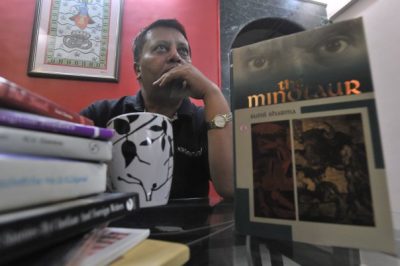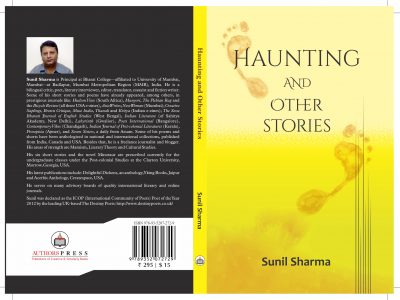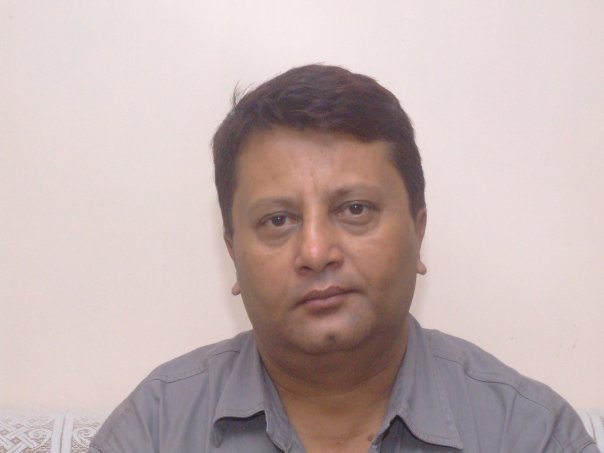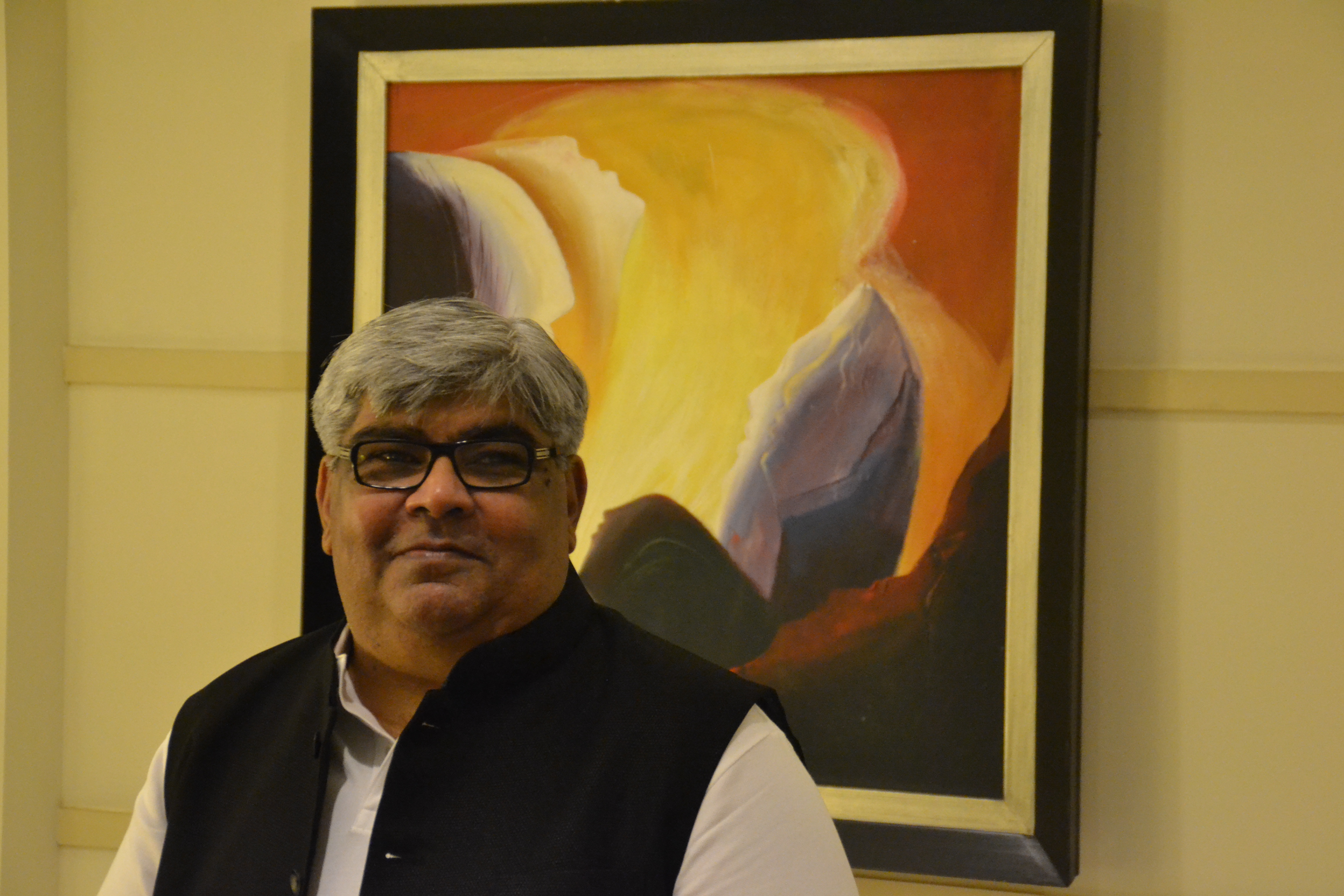A literary conversation between Sunil Sharma and Sanjeev Sethi
Sunil Sharma is an energetic man. With alacrity his creative energies goad his literary outputs to grace literary platforms the world over. In the last month itself I have chanced upon him in Tuck Magazine, Dead Snakes, Muse India, Work Literary Magazine, Social Justice Poetry, among others. His work is beyond borders.
Sunil has a home wherever words are worshiped, where testimonies of thought merge with the emblems of acceptance. His aim is to add to the conversation. For readers who wish to get an idea of his oeuvre I urge them to read (or reread) his interview with Rob Harle published here on January 21, 2016. You will notice his control over his medium. It is no surprise that six of his short stories and novel (The Minotaur) are prescribed for undergraduate students in the Post-colonial Studies, department of Clayton University, Georgia, USA.
On the cusp of releasing his seventh creative book, Haunting and Other Stories (four poetry, two short story and a novel) we exchanged series of emails.
SANJEEV SETHI: Congratulations on the publication of yet another book. How does it feel?
SUNIL SHARMA: Well, like waiting outside the maternity ward, tensed, finally you get the result: delivery successful. It is akin to that feeling, post-production. Writing part? Well, inside the ward, post-delivery, the same announcement and young mother’s smile that can dazzle the sun!
Birth! Always thrilling!
SETHI: Poetically put. Tell us briefly about Haunting and Other Stories?
SHARMA: Haunting is about after-life of great authors/works. Serious art and its resurrection in right hands. Readers reviving the writer, the age, comatose through a delicate touch! It is magical! Other stories document urban horror we all are sinking into, minus the Gothic tropes! Enough tell-tale clues. Rest—on your discovery.
SETHI: I am sure (Smiles). How do you decide the form?
SHARMA: The material; the idea; content; image. Short fiction is a challenging form. Poetry captures a fleeting mood, emotion, image, in 30-40 lines these days or less. Short fiction also deals with an image or idea but requires different set of skills. So, it is the dialectics of form and content. Your material determines the form. Longer fiction (novel) for longer ideas.
SETHI: Longer as in canvas. Where does that leave depth?
SHARMA: Depth is relative. Chekov can punch many insights into a short than a rambling best-seller of today. The Russians are adept in providing in-depth content, to use current terminology. Poetry is a good vehicle—like every other literary form to convey ideas. Depends on the poet. Kabir can reveal great truths in his simple couplets. So can a Haiku.
It depends on the vision and the person more than any genre. Eliot captures the angst of a generation in his Waste Land so well. Current poetry is micro, self-obsessed, fractured. The community is largely missing. To provide global vision, you have to be embedded in that community. Alienated, self-seekers, glory-dreamers are denied such an overarching vision of the struggles and joys of living in complex societies within their ghettos.
Basho is relevant…and refreshing. Look at the economy of expression:
The old pond—
a frog jumps in.
The sound of water. (Translated by Robert Hass, Frog Haiku)
It is kinetic. Silence; action; sound. Well, pure metaphysics! Way to realize self. Through self the world, and ultimate realization of something bigger than self.
SETHI: As a practicing poet, how do you see the contemporary poetic scene in India. Let us keep the focus to writings in English? How does it compete with the UK, USA, and Australia?
SHARMA: There is a boom. FB-fuelled boom. Social media—internet—has opened up a vast space. It is bewildering! The sheer size of current poetry is staggering in the cyberspace. Earlier, print media, it got filtered down.
The reach of such media is large. Our own reach to this public media is another facilitating factor for poetry’s enormous growth. You feel stirrings of a poetic kind and have the liberty of posting on various sites. Print, it was different—more time-consuming and editor-dependent. A democratic development. Needs a canon. Time will judge this mass outpouring lyrical.
Regarding poetry UK, USA and Australia, well, being part of national narrative, poetry as a literary form reflects national traits and linguistic peculiarities of each nation and its ethos. I find UK effete and inward-looking. USA—market-driven. Australia—still trying to find a coherent voice and identity. Indians—suffering from a massive sense of inferiority and cultural complex created by a colonial system and a post-colonial legacy—prefer to write English in a big way. Most such poetry-English is quaint, Victorian and cliched. Few hugely- hyped brown sahibs of English here imitate the foreigners of their choice, dream of international awards and a Guardian column or USA academic position/ Pulitzer. It is deeply networked and outsiders are not permitted entry.
Ridiculous! Poetry is not Cafe-discussions, seeking glory or awards. It is about general public and national diagnosis, not formal linguistic innovations or imagery beyond us. It is not appealing to me. Not very distinguished or original. The poets have to work real hard to gain global attention and sustain it. Otherwise, it is just an insider’s job—for another insider within a small but tight circle.
Indian languages are producing better poetry; it is firmly rooted in local idiom/syntax and soil and for me, performs better than the Indian English Poetry which is aspirational, urban and middle-class phenomenon with very limited appeal and thin content—a watered soup served in a Dickensian novel to Oliver with a good appetite. Rest—on your stance, reading. It is the view of an alert reader only, not necessarily a critical voice. I am not qualified to be a critic. As a reader, we approach a work/genre with some expectations. We invest money in a book and want returns. If a mismatch, you become disappointed in the investment. Sure, some will find it outrageous. For some, it might sound blasphemous. Vested interests. Agendas. A reader is a final connoisseur. Hence, my judgement, atrocious or not. For many, these observations are common place and part of counter folklore. Introspection and dispassionate studies are required for an objective evaluation of this development in a language bequeathed to us as a post-colonial heirloom. We need an Ngugi to de-construct the entire apparatus of control and domination and stop looking at India from a Western filter. Indianisation of content is urgently required to make poetry broad-based and enduring.
SETHI: Do you think one reason could also be the lack of critical structures. In short, does criticism help or harm the creative process?
SHARMA: Objective criticism helps build reputations. Subjective can be destructive—Shelley and Keats suffered a lot! Great critics are missing. Like a friendly book-review, criticism should not be laudatory. It should bring the inner dynamics of the text, place it in the context and critique, warts and all.
SETHI: Do awards help spurring creativity?
SHARMA: Awards and their politics! Any sponsorship carries its own agenda. Anti-India rhetoric can fetch good dividends in the West. India—where are the awards for the young? For small-town writers? Where are the Fests for promoting writing from such places? Is it not a jamboree promoting the already-promoted? Elites getting plum awards. Plebeians remain incognito.
Awards again are result of networking and lobbying and for toeing in an official line of the agency.
Point: Majority of dissident writing goes un-awarded and un-recognised. But not for long. Van Gogh is an illustrative example.
Another notable example is Tolstoy. Gandhiji was never considered for the Nobel.
It is atrocious.
For me, writing is not about getting the awards but about a silenced community. By giving voice, a writer—classical sense—achieves an after-life denied to lesser mortals.
SETHI: Well said, thank you Sunil.
Sunil Sharma
An English teacher with more than 23 years of degree-college teaching experience that includes administrative one (as vice-principal and now as full-fledged principal); freelance journalist with 15 years experience writing for the supplements of the Times of India, Mumbai, India and a widely-published bi-lingual writer, poet, novelist, interviewer, blogger, reviewer and literary editor.





Wonderful discussion, you drew out the true feelings of Sunil, Sanjeev. Congratulations to you both.